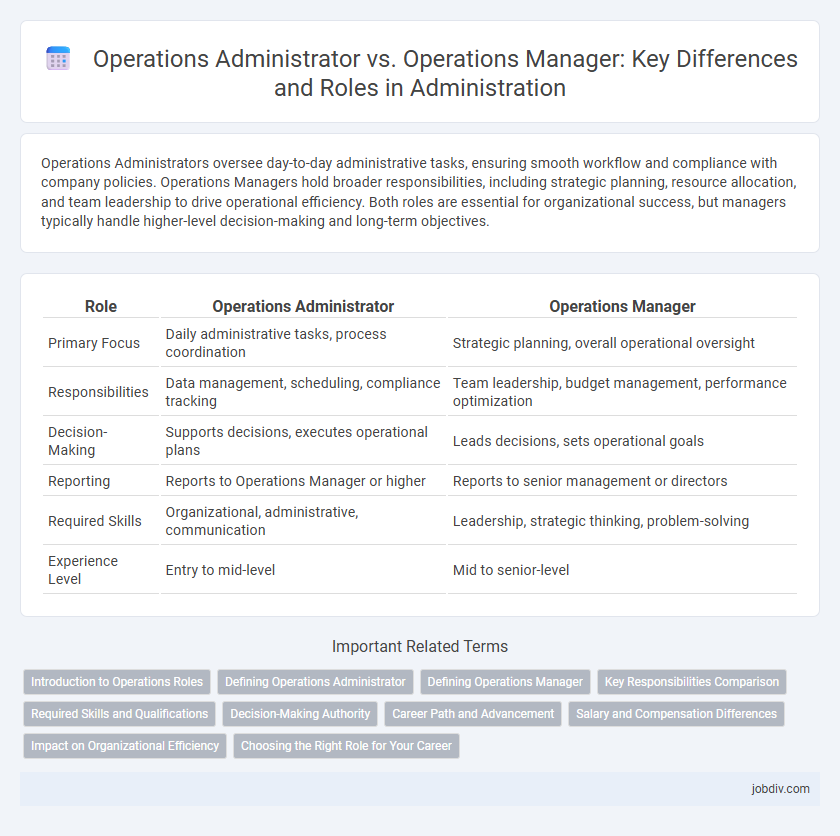Operations Administrators oversee day-to-day administrative tasks, ensuring smooth workflow and compliance with company policies. Operations Managers hold broader responsibilities, including strategic planning, resource allocation, and team leadership to drive operational efficiency. Both roles are essential for organizational success, but managers typically handle higher-level decision-making and long-term objectives.
Table of Comparison
| Role | Operations Administrator | Operations Manager |
|---|---|---|
| Primary Focus | Daily administrative tasks, process coordination | Strategic planning, overall operational oversight |
| Responsibilities | Data management, scheduling, compliance tracking | Team leadership, budget management, performance optimization |
| Decision-Making | Supports decisions, executes operational plans | Leads decisions, sets operational goals |
| Reporting | Reports to Operations Manager or higher | Reports to senior management or directors |
| Required Skills | Organizational, administrative, communication | Leadership, strategic thinking, problem-solving |
| Experience Level | Entry to mid-level | Mid to senior-level |
Introduction to Operations Roles
Operations Administrators primarily focus on executing daily operational tasks, ensuring workflows run smoothly and administrative processes are efficiently handled. Operations Managers oversee broader strategic planning, resource allocation, and team leadership to align operations with organizational goals. Understanding these roles clarifies responsibilities and enhances coordination within business administration.
Defining Operations Administrator
An Operations Administrator manages daily administrative tasks, ensures smooth workflow, and supports operations by coordinating schedules, handling documentation, and facilitating communication among teams. This role emphasizes operational continuity by maintaining accurate records, tracking performance metrics, and assisting with process improvements to enhance efficiency. Unlike an Operations Manager who leads strategic planning and oversees broader operational goals, the Operations Administrator focuses on executing routine functions and enabling effective management support.
Defining Operations Manager
An Operations Manager oversees daily organizational processes, ensuring efficient workflow, resource allocation, and adherence to company policies. They develop strategic plans, manage teams, and optimize operational performance to meet business objectives. Responsibilities often include budgeting, performance monitoring, and liaising between departments to drive continuous improvement.
Key Responsibilities Comparison
Operations Administrators manage daily administrative tasks such as scheduling, record-keeping, and coordinating communication to ensure smooth workflow and support operational efficiency. Operations Managers oversee broader strategic functions including resource allocation, process optimization, target setting, and team leadership to drive organizational performance and achieve business goals. The key difference lies in the scope, with Administrators focusing on execution of routine operations and Managers handling high-level decision-making and operational planning.
Required Skills and Qualifications
Operations Administrators require strong organizational abilities, proficiency in administrative software, and excellent communication skills to manage daily operational tasks efficiently. Operations Managers need advanced leadership qualities, strategic planning capabilities, and expertise in budget management to oversee broader business functions and drive company objectives. Both roles benefit from analytical thinking and problem-solving skills, but managers typically hold higher education degrees such as a bachelor's or master's in business administration or a related field.
Decision-Making Authority
An Operations Manager holds higher decision-making authority, overseeing strategic planning, resource allocation, and process improvements across departments. Operations Administrators execute daily tasks and support managers by implementing policies but have limited autonomy in critical decisions. The distinction emphasizes managerial roles involving long-term organizational impact compared to administrative roles focused on operational consistency.
Career Path and Advancement
An Operations Administrator typically supports daily organizational functions and gains foundational experience in process management, which serves as a stepping stone to more strategic roles. Progression to Operations Manager involves acquiring leadership skills, overseeing teams, and managing broader operational strategies, marking a significant career advancement. Career paths in administration often transition from operational support roles to managerial positions with increased responsibility and decision-making authority.
Salary and Compensation Differences
Operations Managers typically earn higher salaries than Operations Administrators due to greater responsibilities and leadership roles, with average annual salaries ranging from $70,000 to $120,000 compared to $40,000 to $65,000 for Administrators. Compensation packages for Operations Managers often include bonuses, profit sharing, and stock options, reflecting their strategic impact on company performance. In contrast, Operations Administrators usually receive standard benefits and smaller performance incentives tied to administrative efficiency.
Impact on Organizational Efficiency
Operations Managers drive organizational efficiency by strategizing resource allocation and optimizing workflows, leading to increased productivity and reduced operational costs. Operations Administrators support this efficiency through precise execution of administrative tasks, ensuring smooth day-to-day operations and compliance with organizational policies. The synergy between these roles enhances overall operational performance and organizational scalability.
Choosing the Right Role for Your Career
Choosing between an Operations Administrator and an Operations Manager depends on your career goals and desired level of responsibility. Operations Administrators typically handle day-to-day administrative tasks and support functions, requiring strong organizational skills and attention to detail. Operations Managers oversee broader operational strategies and team leadership, making this role suitable for professionals aiming to drive business growth and manage complex projects.
Operations Administrator vs Operations Manager Infographic

 jobdiv.com
jobdiv.com